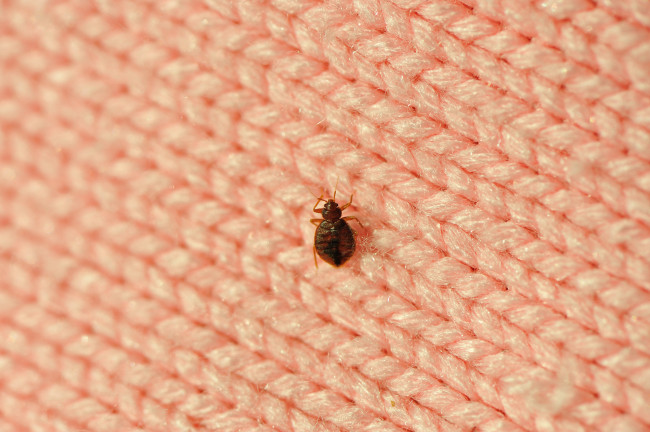Bed bugs turned their NYC apartments into nightmares. So why do their landlords say these properties are bed bug-free?
- Most NYC landlords are required to disclose the bed bug history of their buildings’ apartments on an annual report
- At least 46 buildings received HPD violations for bed bugs, despite their owners reporting the properties as bug-free
- It’s rare for a landlord to file a false bed bug report, but when they do, it’s unclear if there are any consequences
Eddie has rented a small studio apartment on the Upper East Side for 10 years. He’s been battling bed bugs for at least four.
Eddie, who declined to give his full name out of fear of retaliation from his landlord, said he has sprayed his apartment with alcohol, had the unit treated by an exterminator multiple times, and even enlisted the services of a bed bug-sniffing dog. The New York City Department of Housing Preservation and Development (HPD)—which enforces the city’s housing code—slapped violations on the building last year to force the landlord to remedy the infestation.
But on paper, Eddie’s apartment building has never had a problem with bed bugs—at least according to the bed bug report most landlords are required to file every year.
Under city law, owners of three or more units must attempt to get the bed bug history of their apartments from tenants, and report to HPD whether any units recently had bed bugs, had been treated for bed bugs, or had been re-infested with bed bugs. Landlords are required to file this report every year in December, using information from tenants and the landlord’s own activities, according to HPD.
The reports on Eddie’s building say the property has been free of bed bugs from 2019 through December 2023, after HPD mailed his landlord notices of bed bug violations, and asked the owner to fix the infestation.
Eddie’s situation is unusual, but not unique. Brick spoke to two other NYC renters who said their apartments at the same Flatbush, Brooklyn building have had bed bug infestations, despite the fact that their building’s annual bed bug report said the property has never had an issue with the pests.
Some landlords hit with violations file bug-free reports
When a renter complains about bed bugs to the city (usually by calling 311 or going online), HPD can send out a code inspector to check out the apartment and issue a violation if they see live bed bugs. HPD then sends the building owner a notice in the mail telling them to fix the issue within about a month, or they can face fines of $10 to $125 a day, plus a flat fee and an inspection fine.
HPD can, and has, issued violations to landlords who don’t file their annual report within the month of December each year, as required by Local Law 69 of 2017. But it’s unclear if there are specific consequences for filing a false report.
False reports are by no means widespread. The number of violations in buildings that were reportedly bed bug-free amounted to just over 5 percent of the 1,024 violations sent out from January through April 19th, 2024. It’s far more common for a landlord to fail to file the report: (HPD had sent out more than 50,000 violation notices for missing reports during the first five months of 2024, according to data available on NYC Open Data.)
But Brick Underground did find 46 buildings where the landlord had claimed the property was bed bug-free after receiving a violation from HPD for an infestation. That means that an inspector saw bed bugs, HPD then issued the landlord a violation, and the landlord still reported that the building was bug-free.
Of those 46 buildings, 30 were slapped with violations for bed bug infestations where the property owner had reported that the building was bug-free sometime in December 2023, the filing period for the report covering November 2022 to October 2023. (HPD also sent violations to the other 16 buildings where the owner filed the bug-free report late, according to NYC Open Data).
"Property owners have an obligation to report accurate and truthful information to the department for the health and safety of New Yorkers,” Natasha Kersey, deputy press secretary for HPD, said in an email. “If tenants suspect they have bedbugs in their home, they should contact their landlord, and call 311. One of our inspectors will visit and assess the conditions."
Kersey did not respond to questions regarding whether HPD had issued fines or violations for false bed bug reports.
Limited consequences for lying
Unfortunately for these renters, there are few consequences for filing a false bed bug report with HPD, said Sam Himmelstein, a lawyer at Himmelstein McConnell Gribben & Joseph (and a Brick sponsor, FYI).
If a landlord falsely claimed there were no past bed bug infestations before a tenant moved in, the tenant could argue the landlord committed fraud by misrepresenting the condition of the apartment. It’s also a crime to intentionally file a false document with a government agency under New York state law. But it can be difficult to prove a landlord knowingly lied, Himmelstein said.
“It’s a crime that you do not see prosecuted very often, but it is a crime,” Himmelstein said. “If it were prosecuted, half the landlords in New York would be in jail.”
Holes in what the annual report covers
Plus, landlords are not required to disclose if there was an infestation in a building’s common areas on the annual report. That’s something Bronx native Sabrina Foglia learned firsthand when she moved into a new apartment in Flatbush in 2021.
Initially her $1,400-a-month, rent-stabilized apartment at 985 Ocean Ave. was just what she wanted: small but homey, with a good kitchen and friendly neighbors. But last year, during the summer, she caught a bed bug crawling around her bathroom.
That one bug kicked off a court battle with her landlord, nearly $2,000 in laundry bills and hotel stays, and Foglia’s discovery that her landlord had reported that the building’s apartments were bed bug-free on the building’s annual report.
HPD slapped two violations on the building in September and October for bed bugs in the building’s hallway, which the landlord isn’t required to include in the annual report. (Those violations have since been closed). But Foglia said that there were bugs inside her unit as well.
Photos, videos, and emails she and another renter shared with Brick Underground show bed bugs inside their apartments and indicate that management was aware of the bugs (likely stemming from a neighbor’s infestation, Foglia said), and document the multiple treatments their property manager arranged to solve the issue.
Yet, according to her building’s annual bed bug reports from 2019 through 2023, 985 Ocean Ave. has never had a bed bug problem.
HPD records indicate that the building is owned by Adam Parkoff, who runs the Long Island-based family firm The Parkoff Organization. A representative for the landlord, Parkoff Management Company, did not respond to multiple requests for comment.
Foglia, who spent months on an air mattress, “worried every single day” about another infestation, said the report should cover a building’s common spaces and that the HPD should check to see if these reports are accurate.
“I think the report needs to be fixed,” Foglia said. “There could be a line that says how many public areas were infested and where….And not for nothing, public areas don’t just get infested. The infestation is coming from somewhere.”
Financial burden of bed bugs
Foglia has since moved out of her apartment on Ocean Avenue. But while she lived there, she said she spent just over $1,100 on a special bed bug laundry service and at least $700 on two hotel stays during the bed bug treatment because she feared it would trigger her asthma.
Most bed bug treatments require the tenant to stay out of the apartment for at least a few hours, said Gil Bloom, an entomologist and president of Standard Pest Management.
Landlords are responsible for remediating bed bug infestations under city law, Himmelstein said. But the renters Brick spoke with also spent their own money on preventative measures—and lots of laundry.
“I did spend a lot of good money,” Eddie said. “I have a lamp that’s supposed to kill them, I have sprays that I purchased on Amazon. And also the laundry—you have to do the laundry all the time. … The laundry is the most tiring and exhausting.”
Emotional distress and social taboo
It’s not just the financial costs of having bed bugs that burdened these three renters. All three described the emotional distress of having to deal with an infestation, and the social taboo that bed bugs carry.
“I was afraid to socialize,” Eddie said. “I was really depressed, and I really felt hopeless … No matter how much you complain, you feel like you're not going anywhere. You feel like nobody is listening to you.”
For the other former 985 Ocean Ave. tenant, who we’ll call Charlie, the stress of their infestation even came up in their dreams.
“The psychological damage of having to deal with a situation like this is very, very hard to overstate,” said Charlie, who declined to give their name out of fear of retaliation from their former landlord. “Not too long ago, I had a stress dream about dealing with another infestation. It’s insane.”
Charlie, like Eddie, was reluctant to socialize or accept help from friends, fearful that their loved ones would get bed bugs too.
“There were so many friends that wanted to help [me] but I felt terrified of letting them into my apartment, lest they bring the infestation back with them,” Charlie said.
“It’s a thoroughly isolating issue, because you can't go to other peoples homes, and they can’t go to yours,” they added. “A lot of your time gets eaten up maintaining your apartment at this state that's preventative. It's really, really stressful. But ultimately, it seemed like there was no hope of things subsiding.”
When the bugs chase you out
Both Foglia and Charlie ditched the Ocean Avenue building rather than risk another infestation.
Foglia decided not to renew her lease, and her landlord recently dropped a lawsuit against her for just over $7,000 for five months of back rent. She and Charlie said they left because they had lost hope that the bed bugs would ever stay away for good.
“There's only so much that a person can withstand before you realize that this isn’t really a life anymore,” Charlie said. “This is just me and the bed bugs.”
Additional data reporting by Nick DeMarchis.
Got a bed bug story for us? Send us your tips and questions to [email protected].





























